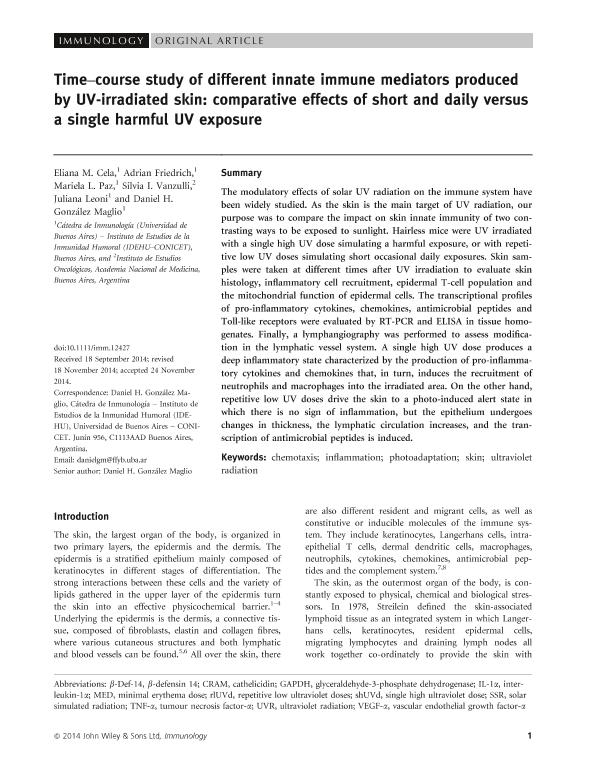Artículo
Time-course study of different innate immune mediators produced by ultraviolet irradiated skin. Comparative effects between short and daily versus harmful and imprudent UV- exposures
Cela, Eliana Maiten ; Friedrich, Adrián; Paz, Mariela Laura
; Friedrich, Adrián; Paz, Mariela Laura ; Vanzulli, Silvia; Leoni, Juliana
; Vanzulli, Silvia; Leoni, Juliana ; Gonzalez Maglio, Daniel Horacio
; Gonzalez Maglio, Daniel Horacio
 ; Friedrich, Adrián; Paz, Mariela Laura
; Friedrich, Adrián; Paz, Mariela Laura ; Vanzulli, Silvia; Leoni, Juliana
; Vanzulli, Silvia; Leoni, Juliana ; Gonzalez Maglio, Daniel Horacio
; Gonzalez Maglio, Daniel Horacio
Fecha de publicación:
11/2014
Editorial:
Wiley
Revista:
Immunology
ISSN:
0019-2805
Idioma:
Inglés
Tipo de recurso:
Artículo publicado
Clasificación temática:
Resumen
The modulatory effects of solar ultraviolet radiation (UVR) on the immune system have been widely studied. As the skin is the main target of UVR, our purpose was to compare the impact of two contrasting ways to be exposed to sunlight on the skin innate immunity. Hairless mice were UV irradiated with a single high UV dose (shUVd) simulating a harmful exposure, or with repetitive low UV doses (rlUVd) simulating short occasional daily exposures. Skin samples were taken at different times post-UV irradiation to evaluate skin histology, inflammatory cell recruitment, epidermal T cell population and the mitochondrial function of epidermal cells. The transcriptional profiles of pro-inflammatory cytokines, chemokines, antimicrobial peptides and TLRs were evaluated by RT-PCR and ELISA in tissue homogenates. Finally, a lymphangiography was performed to assess modification in the lymphatic vessel system. A shUVd produces a deep inflammatory state characterized by the production of pro-inflammatory cytokines and chemokines that, in turn, induces the recruitment of neutrophils and macrophages into the irradiated area. On the other hand, rlUVd drive the skin to a photo-induced alert state in which there is no sign of inflammation, but the epithelium undergoes changes in thickness, the lymphatic circulation increases, and the transcription of antimicrobial peptides is induced.
Palabras clave:
Inflammation
,
Skin
,
Ultraviolet Radiation
,
Photoadaptation
,
Chemotaxis
Archivos asociados
Licencia
Identificadores
Colecciones
Articulos(IDEHU)
Articulos de INST.DE EST.DE LA INMUNIDAD HUMORAL PROF.R.A.MARGNI
Articulos de INST.DE EST.DE LA INMUNIDAD HUMORAL PROF.R.A.MARGNI
Citación
Cela, Eliana Maiten; Friedrich, Adrián; Paz, Mariela Laura; Vanzulli, Silvia; Leoni, Juliana; et al.; Time-course study of different innate immune mediators produced by ultraviolet irradiated skin. Comparative effects between short and daily versus harmful and imprudent UV- exposures; Wiley; Immunology; 1; 145; 11-2014; 82-93
Compartir
Altmétricas



